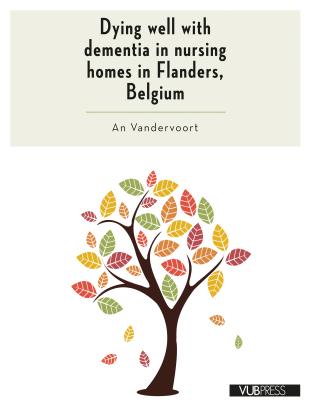Author: An Vandervoort
Date: 24-03-2014
Promotor: Prof. dr. Luc Deliens
Co-Promotor: Prof. dr. Lieve Van den Block
SUMMARY OF THE DISSERTATION
Worldwide there is a continuously growing number of people living to old age. In the EU the population aged 65 and above will almost double from 87 million in 2010 to 153 million in 2060. Moreover, the number of people aged 80 years and above is projected to almost triple from 24 million in 2010 to 62 million in 2060. This significant change in age structure is driven by advances in medical knowledge, improved living conditions and hygiene, hereby changing the pattern of disease and dying from acute infectious diseases to chronic and degenerative diseases such as dementia.
Dementia is one of the biggest global public health challenges facing our generation. There are currently 36 million people living with dementia in the world and this is predicted to almost double every 20 years. A “tsunami” of dementia is predicted worldwide, with 66 million in 2030 to 115 million in 2050. Newly available data suggests that the current burden and future impact of the dementia epidemic has been underestimated. Considering the growing prevalence of dementia, end-of-life care for people with dementia has also become a major public health concern.
Dying has become more institutionalized. The number of people dying in nursing homes is almost certain to increase with the ageing population. Most people with early-stage dementia reside at home; however more than 95% need 24-hour care when the illness progresses, making home care until death fairly unusual. Epidemiological evidence shows dementia as a risk factor for nursing home admission; between 50% and 92% of people with dementia in Europe die in a nursing home as do 67% in the US. The median time from dementia diagnosis to nursing home admission is three to four years. In Belgium, 11.4% of people with dementia died at home, 22.7% in hospital and 65.9% in nursing homes. When studying trends in place of death, home deaths remained stable; however, hospital deaths decreased from 55.1% to 51.7% and nursing home deaths rose from 18.3% to 22.6%5. Despite a shift in priority to community service provision, residential care is still a significant feature of long-term care for people with dementia, and it may be the most appropriate and effective way of meeting someone’s needs when community support (formal and informal) is insufficiënt meaning that nursing homes play an increasing role in caring for frail older people, such as people with dementia, at the end of life.
While we are aware of this increase in people with dementia in nursing homes, we lack reliable data on how many nursing home residents with dementia are currently actually dying in and outside nursing homes, what care they received and what the quality of the dying process is.

